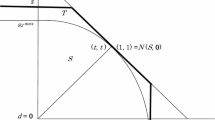Abstract
The Bargaining Problem paradigm is extended to time-consuming conflict situations. Such a situation can be represented by a chain of bargaining domains, each representing the conflict at a different point in time. The solution function selects a point in the union of all these domains. We characterize a solution function which satisfies several requirements and explore its properties. One of the results is that an extension of the Adding requirement (Thomson-Myerson 1980) is enough, under some conditions, to yield a solution point, so there is no need to extend the stronger requirements of Independence of Irrelevant Alternatives (Nash 1950) or Monotonicity (Kalai-Smorodinsky 1975).
Similar content being viewed by others
References
Ashenfelter OA, Johnson GE (1969) Bargaining theory trade unions, and industrial strike activity. American Economic Review 59:35–49
Binmore KG (1980) Nash bargaining theory II. London School of Economics, Discussion Paper 80-14
Binmore KG (1982) Perfect equilibria in bargaining models. London School of Economics, Discussion Paper 82-58
Bishop RL (1964) A Zeuthen-Hicks theory of bargaining. Econometrica 32:410–417
Coddington A (1968) Theories of the bargaining process. Allen and Unwin, London
Contini JG (1968) The value of time in bargaining negotiations: Some experimental evidence. American Economic Review 58:374–393
Cross JG (1965) A theory of the bargaining process. American Economic Review 55:67–94
Foldes L (1964) A determinate model of bilateral monopoly. Economica 31:117–131
Harsanyi JC (1956) Approaches to the bargaining problem before and after the theory of games. Econometrica 24:144–157
Hicks JR (1963) The theory of Wages. McMillen, London 1930
Kalai E (1977) Proportional solutions to bargaining situations: Interpersonal utility comparisons. Econometrica 45:1623–1630
Kalai E, Smordinsky M (1975) Other solutions to Nash's bargaining problem. Econometrica 43: 513–518
Livne Z (1985) The bargaining problem: Axioms concerning changes in the conflict point. Working Paper #85-11, Columbia Business School
Luce D, Raiffa H (1957) Games and decisions: Introduction and critical survey. John Wiley & Sons, New York
MacLennan A (1982) A general non-cooperative theory of bargaining. University of Toronto, mimeo
Moulin H (1982) Bargaining and non-cooperative implementation. Ecole Polytechnique (Laboratoire d'Econometrie), Discussion Paper A239 0282
Nash JF (1950) The bargaining problem. Econometrica 18:155–162
Raiffa H (1953) Arbitration schemes of generalized two-person games. In: Kuhn HW, Tucker AW (eds) Annals of Mathematics Studies 28. Princeton, pp 361–387
Roth AE (1977) Independence of irrelevant alternatives and solution to Nash's bargaining problem. Journal of Economic Theory 16:247–251
Roth AE (1979) Axiomatic models of bargaining. Lecture Notes in Economics and Mathematical Systems No 170. Springer-Verlag, Berlin Heidelberg New York
Rubinstein A (1982) Perfect equilibrium in a bargaining model. Econometrica 50:97–109
Stahl I (1972) Bargaining theory. EFI, The Economic Research Institute, Stockholm
Thomson W (1981) A class of solutions to bargaining problems. Journal of Economic Theory 25: 431–441
Thomson W, Myerson RB (1980) Monotonicity and indpendence axioms. International Journal of Game Theory 9:37–49
Young OR (1975) Bargaining: Formal theories of negotiation. University of Illinois Press, Urbana
Zeuthen F (1968) Problems of monopoly and economic warfare. Routledge and Kegan Paul, 1930, pp 104–135
Author information
Authors and Affiliations
Additional information
This paper is based on part of my 1979 Ph.D. dissertation at MIT. Its preparation was partially sponsored by the Office of Naval Research Contract Number N00 014-77-C-0518. I am grateful to H. Raiffa, G. Kaufman, J. Ferreira, E. Kohlberg and the referees for valuable comments.
Rights and permissions
About this article
Cite this article
Livne, Z. Bargaining over the division of a shrinking pie: An axiomatic approach. Int J Game Theory 16, 223–242 (1987). https://doi.org/10.1007/BF01756293
Received:
Revised:
Issue Date:
DOI: https://doi.org/10.1007/BF01756293




